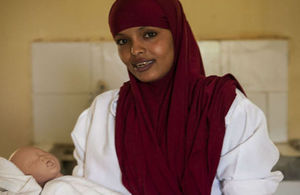Zero tolerance to FGM in Somaliland
Zero tolerance to FGM at the Midwifery Training School in Burao, Somaliland

JHNP
Nemo Abdi Ahmed, age 20, left her remote village to attend the Midwifery Training School in Burao, Somaliland. A few years earlier, one of Nemo’s 17-year-old friends and a former classmate had died during childbirth. “That’s one of the main reasons that I want to learn these life-saving skills,” Nemo said. “I want to prevent the deaths of mothers and children in my community. That’s why I want to be a midwife,” she added.
The common practice of Female Genital Mutilation (FGM) causes additional complications during deliveries. “Circumcision creates problems,” Nemo says. “The major problem is fistula, because the traditional birth attendants try to cut to increase the birth passage, but they don’t have the skills or the knowledge, and they don’t have the proper tools, which can cause great amounts of damage,” she continues, shaking her head.
In Nemo’s community, the majority of women have been circumcised. However, Nemo believes that the practice of female circumcision will slowly fade away as people begin to realize the negative effects that it has on women’s health. “It’s too difficult for the women to give birth when they have been circumcised,” she says. “It’s unnecessary. It creates too many problems for women. Periods can not take place in a normal way, delivery is a problem, sexual intercourse is also a problem, and it’s uncomfortable because the normality has been completely changed,” she continues. “People just need more effective education and awareness. Once people have been educated then the practice of circumcision will decrease,” she says. Once she has completed her midwifery training, Nemo will be able to share this knowledge with her community and, in turn, save the lives of the women and children in her village.
It is believed that 98% of women have undergone FGM in Somalia. The Midwifery Training Programme in Burao, Somaliland, which is supported by the Joint Health and Nutrition Programme (JHNP), is ensuring the midwives have the knowledge to not only treat the complications arising from FGM but also give them the skills to inform and educate Somali women about the effects of the practice in an effort to stop it from happening.
By 2016, the JHNP will provide over 5.5 Million Somalis with much needed free-access to an essential package of health services, while ensuring that a minimum of 13,000 women have access to life saving comprehensive emergency obstetric care at 24 hour referral hospitals in nine targeted regions of Somalia.
The programme is also building the Somali Health System by improving government leadership, training and deployment of skilled health workforce and providing essential medicines, vaccines and technologies.
The JHNP is a multi-donor development programme, implemented by WHO, UNICEF and UNFPA, together with the Somali Health Authorities and supported by DFID, Government of Sweden, Government of Finland, Australian Agency for International Development (AusAID), Swiss Agency for Development and Cooperation (SDC) and United States Agency for International Development (USAID).